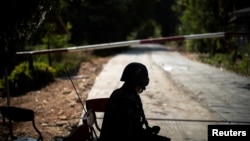Members of Myanmar's anti-military resistance face the risk of being forcibly returned to their homeland if they cross into Thailand, experts and rights groups say.
The threat became apparent after three members of a Myanmar anti-military group were recently detained by Thai authorities and handed over to the Myanmar junta.
Ko Thiha, Ko Htet Nay Win and Ko Saw Phyo Lay, three members of Myanmar's Lion Battalion Commando Column, were arrested on April 1 in the border town of Mae Sot in Thailand on illegal entry charges. The three had reportedly entered for medical treatment following an altercation that saw two of them shot by Myanmar's Border Guard Force, local reports say.
Lalita Hanwong, Southeast Asian history lecturer and social sciences instructor at Kasetsart University in Bangkok, told VOA the strong relationship between the Thai and Myanmar militaries is the reason for the action.
"During [Thailand Prime Minister] Prayut Chan-o-cha's regime, Thailand and Myanmar have been quite close, especially after the coup in Myanmar in 2021, so it's quite simple really. The two armies are very close and Thailand doesn't want to break the bond with the Tatmadaw," she said.
"They try to convince the Tatmadaw, 'We can't help you so much in the international arena, we don't want to show the world we are your friend.' [But] what they can do is along the border, they can try and support the Myanmar army, feeding the army some food, trying to capture or arrest some political refugees, and things like that."
The Tatmadaw refers to Myanmar's military.
Thai-Myanmar relations
Thailand and Myanmar share a 2,414-kilometer border, making Thailand readily accessible to Myanmar refugees who wish to flee the conflict there. According to the U.N., 91,000 refugees from Myanmar are in Thailand, although the latter is not party to the 1951 Refugee Convention and has no specific domestic legal framework for protection of urban refugees and asylum-seekers.
Despite the close relations between the two Southeast Asian neighbors, the current Thai government doesn't wish to see a permanent refugee crisis, Hanwong said.
"The Thai government doesn't have intentions to keep any Myanmar refugees whatsoever. There are still camps along the Thai-Myanmar border, but at the end of the day the Thai government will always want to shut them down," Hanwong said.
"They now call them temporary camps; they don't say refugee camps because refugee camps mean something more permanent. If they get some political refugees in Thailand, their responsibility is to send them back. They just want to please the [Myanmar's State Administrative Council], they just want to show, we are your friends."
Sann Aung, executive director of the New Myanmar Foundation, a civic and humanitarian group in Mae Sot, said anyone who is part of the resistance to the junta is at risk in Thailand.
"It is worse for the people who are in resistance or in opposition to the military regime. They are sent back forcibly without their consent and without caring for the safety and security of them, they will be handed over to the military regime. The people can be used, extorted, interrogated over their activities," he told VOA.
Sann, who was an elected member of parliament in Myanmar in 1990, said Thai authorities should investigate the people who are caught and see what dangers they pose if they are returned.
"They should check with the people about their activities; if they are from the resistance or pro-democratic activists against the military, they should not send them back," he added.
Human Rights Watch, a non-profit human rights group headquartered in New York, says Thailand has collaborated with Myanmar to "harass, arrest and forcibly return asylum-seekers."
Elaine Pearson, the HRW Asia director, criticized the decision to return the three.
"Thai officials colluded with the Myanmar junta by unlawfully returning these three opposition activists, whose lives and freedom are threatened. Thai authorities disregarded the grave dangers the men face in Myanmar."
A Human Rights Watch report also notes that Thailand has ratified the Convention Against Torture and Other Cruel, Inhuman or Degrading Treatment or Punishment and signed the International Convention for the Protection of All Persons from Enforced Disappearance.
Both treaties have been incorporated into Thailand's Act on Prevention and Suppression of Torture and Enforced Disappearance, which was enacted in 2022, prohibiting deportation or extradition of a person to another country if they are in danger of being tortured or if they disappear by force.
National Unity Government
The National Unity Government, Myanmar's shadow government formed by ousted politicians and regional leaders in the wake of the coup, says the decision to return the three Myanmar refugees was not in line with international policing procedures and concerns remain about their condition.
"[The Myanmar State Administrative Council] said that all three are still alive but we can confirm that only two are alive according to their photos. We haven't got any updates," NUG spokesperson Nay Phone Latt told VOA.
Myanmar has been in crisis since the military coup led to the removal of the democratically elected government. Army leaders are now in charge. The takeover has been strongly opposed by the Myanmar population that has fueled an armed resistance movement of activists, ethnic minority groups and an anti-coup group armed wing known as the People's Defense Forces. Conflict in the country has turned into civil war.
Since the coup, at least 3,408 people have been killed by military forces, according to a Thailand-based monitoring group, the Assistance Association for Political Prisoners.





